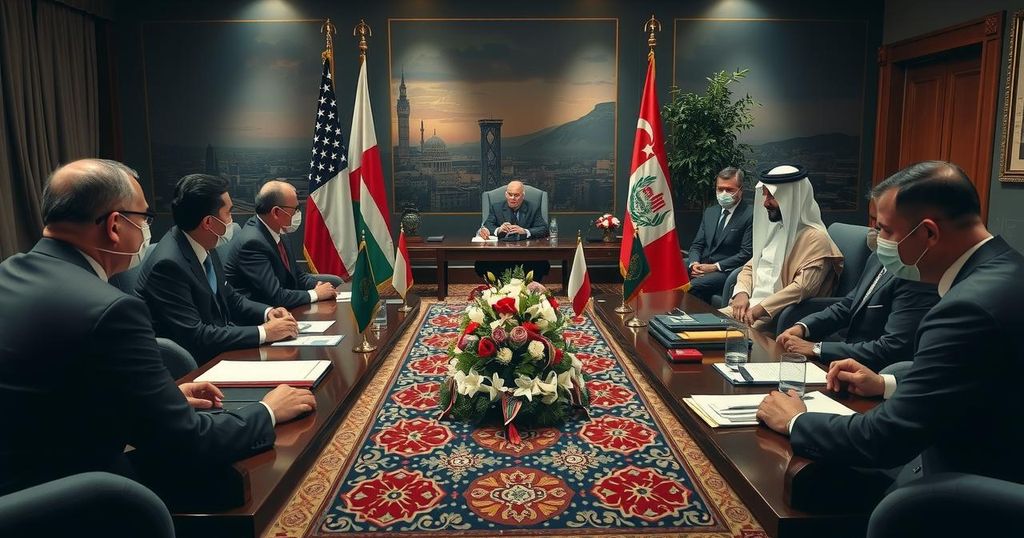Diplomatic Engagements Mark a Week of Urgent Discussions on Middle Eastern Stability

In a series of high-stakes meetings, Secretary of State Antony Blinken engaged with foreign leaders from the UAE, Lebanon, and Jordan to address the pressing humanitarian crises and ongoing conflict in Gaza. The discussions aimed at fostering diplomatic solutions, stabilizing Lebanon’s political landscape, and aligning on strategies to secure lasting peace in the region.
Secretary of State Antony Blinken concluded a vigorous week of diplomatic engagements in the Middle East with discussions in London on Friday. He met with key officials including United Arab Emirates Foreign Minister Sheikh Abdullah bin Zayed Al Nahyan, Lebanese Caretaker Prime Minister Najib Mikati, and Jordanian Deputy Prime Minister and Minister of Foreign Affairs Ayman Safadi. Throughout these meetings, the focus was primarily on resolving the ongoing conflict in Gaza, addressing humanitarian concerns, and stabilizing Lebanon’s political situation. In his meeting with Sheikh Al Nahyan, Blinken emphasized the imperative of ending hostilities in Gaza and securing the release of hostages. He also addressed the need for a plan for the post-conflict recovery in the region. On the topic of Lebanon, Blinken stressed the importance of a diplomatic resolution centered around the full implementation of United Nations Security Council Resolution 1701. He expressed gratitude for the UAE’s humanitarian aid efforts towards both Lebanon and Gaza. Concerning Prime Minister Mikati, Blinken reaffirmed the United States’ support for Lebanon’s sovereignty and attributed significance to enabling displaced individuals to return to their homes. He acknowledged the dire circumstances of civilian lives affected by the conflict and reiterated the necessity of protecting vulnerable populations. Blinken conveyed that Iran and Hezbollah must not impede Lebanon’s security and stability, advocating for the safety of the UN Interim Force in Lebanon during his discussions. Furthermore, he highlighted the critical role Jordan plays in supporting diplomatic efforts and humanitarian needs in Gaza, commending the country’s leadership. The urgency of achieving a diplomatic resolution regarding the Israel-Lebanon border was a recurrent theme in Blinken’s discourse. During a press briefing, Safadi articulated the precarious state of the region and called for immediate action to halt aggressive measures by Israel, noting that these actions contribute to escalating tensions. He echoed the sentiment for a collaborative approach towards establishing a lasting peace that secures the region’s safety. The discussions illuminated a strong commitment from the United States to engage deeply with Middle Eastern allies in a concerted effort to alleviate suffering and restore stability in the region, with an emphasis on protecting civilians and addressing humanitarian crises directly related to ongoing conflicts.
This article discusses Secretary of State Antony Blinken’s diplomatic efforts in the Middle East, focusing on his recent meetings with officials from the United Arab Emirates, Lebanon, and Jordan. The negotiations center on pressing issues such as the ongoing conflict in Gaza, the humanitarian crises it has engendered, and the need for political stability in Lebanon. The collaborative efforts reflect broader U.S. aims to facilitate peace and security in the region amid significant geopolitical tensions, particularly the roles of Iran, Hezbollah, and the dynamics between Israel and its neighbors. Furthermore, the article highlights the critical role of U.S. engagement in fostering dialogue and resolving conflicts through diplomatic means.
In conclusion, Secretary Antony Blinken’s diplomatic discussions underscore a resolute commitment by the United States to foster stability and peace in the Middle East. By actively engaging with key regional leaders, Blinken aims to address critical humanitarian issues, navigate complex geopolitical tensions, and promote diplomatic resolutions that uphold sovereignty and protect civilian lives. The emphasis on cooperation with allies like Jordan and the UAE illustrates a strategic approach to enhance regional security and humanitarian efforts, while the urgent need for a resolution to the ongoing conflicts persists as a paramount concern for all parties involved.
Original Source: www.jpost.com








